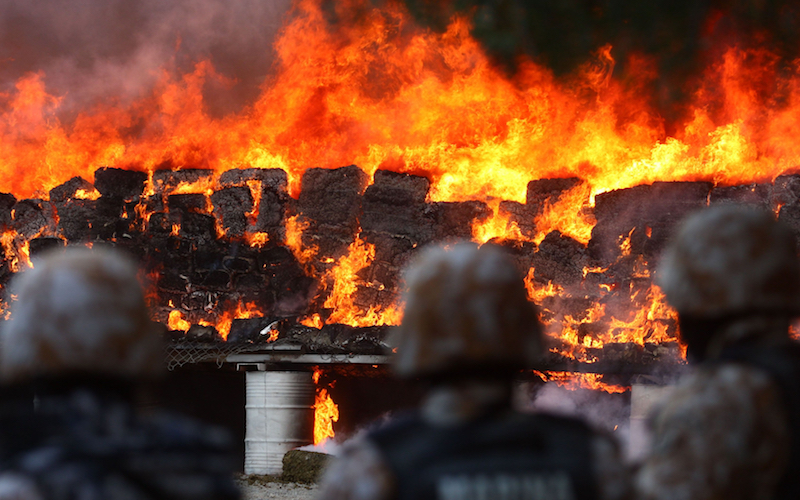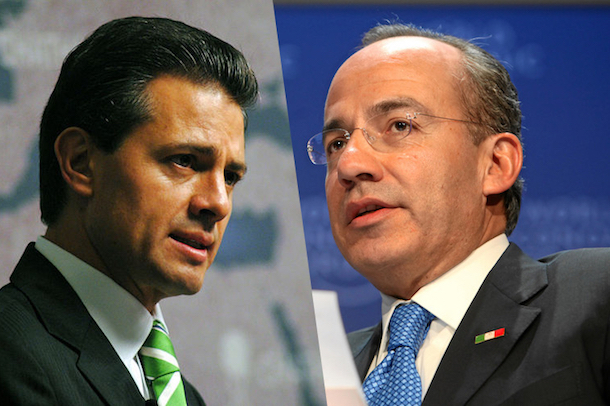
Mexico’s War on Drugs Has a Long Shelf Life
In mid-December, the tenth anniversary of the start of the Mexican War on Drugs passed largely unacknowledged by many news outlets. Indeed, this is unsurprising, given that the Drug War has become so normalized. Every passing year of narco and state brutality only further desensitizes us to the degradation of human life that continues throughout Mexico. It is now simply accepted that the country exists in a state of internal conflict, and so marking anniversaries seems somewhat redundant. This is particularly so as the Mexican drug war appears to have no end in sight.
However, we should not allow such anniversaries to slip beneath the radar. The War on Drugs initiated by President Felipe Calderón in 2006 has changed Mexico. Therefore, it is worth reflecting upon the achievements of the last decade. Furthermore, at the risk of evoking tired clichés about the New Year, we should look to the future. Current Mexican President Enrique Peña Nieto has now entered the final two years of his term, and US President-elect Trump is due to be inaugurated later this month. I suspect that neither political change will improve the situation in Mexico, and could prolong the violence further still.
Ten days after his inauguration, Calderón deployed an extra 50,000 soldiers and police throughout Mexico. This signaled the start of the government’s War on Drugs in its current incarnation.
It is worth noting that Mexican counter-narcotics policy dates back to the support given to Nixon’s US War on Drugs. During the Nixon Presidency, the Mexican government and the DEA cooperated in trying to eradicate heroin and marijuana production, chiefly within the fertile region known as Mexico’s Golden Triangle. Having proven to be devastating in Vietnam, the herbicide Agent Orange was provided to the Mexican government by the US, and used to destroy narcotics plantations.
These tactics were successful in combating drug production. Within three years the amount of Heroin entering the United States was almost cut in half, and the amount of marijuana being consumed had dropped by approximately 70%. However, demand from the US never decreased. Thus, drug production simply became more lucrative.
By contrast, the War on Drugs begun by Calderón ten years ago was not simply aimed at diminishing narcotics production. Rather, Calderón responded to growing inter-cartel violence. Indeed, he never hoped to end drug production and trafficking and instead sought to dismantle the cartels. To accomplish this Calderón prioritized the role of the military, rather than using just the police- a notoriously corrupt institution. He failed dramatically to meet his aims. The cartels are still thriving, and murders and disappearances are common throughout the country.
The death toll of the War on Drugs was cited at approximately 60,000 people dead when Calderón left office. Currently, statistics in excess of 80,000 victims are commonly cited. Others believe that the number is far higher, reporting that close to 200,000 people have died due to the conflict. The number of documented torture victims since 2007, abused by both the state and the cartels, is approximately 8,000. Furthermore, estimates place the number of those who have disappeared during the war at close to 30,000. That is nearly as many victims that some sources estimate disappeared during Argentina’s Dirty War. Mass disappearances such as the 43 Ayotzinapa students are shocking, and rightfully demand the attention of the international media. However, they sadly represent just the tip of the iceberg.

Peña Nieto was elected on a mandate of stopping the violence that had escalated under Calderón. However, like his predecessor, he too has failed. Peña Nieto vowed to change the government’s approach. Instead of targeting the Cartel’s and their leaders directly through military force, he promised to try and curb the levels of narco-related kidnappings and murders. Many suspected that Peña Nieto’s PRI party would try and lower crime by cutting deals with high level narcos. However, his administration does not in fact seem to have deviated from the model laid out by Calderón. Indeed, many high level narco’s have been apprehended under the Peña Nieto government, including most famously Joaquín “El Chapo” Guzman.
The continued levels of bloodshed and violence in Mexico reflect the fact that there has been little change in government policy between the Calderón and the Peña Nieto presidencies. Of course, the cartels too are to blame. They are at war with each other, and the fallout of their territorial conflicts accounts for many thousands of deaths. However, the government appears to have made no significant progress over the last decade. They seem to have learned little. There is no end in sight.
Earlier last month Mexico’s Defense Secretary himself, General Salvador Cienfuegos, corroborated this. Cienfuegos essentially abandoned any pretense that the War on Drugs could be won. He claimed that the war would not succeed through violence and that other measures should be adopted. He stated that all Mexican soldiers should return to their barracks.
It is unlikely that Peña Nieto will change in his last two years in office. His campaign promises of stopping violence are now irrelevant. However, the possibility remains that his successor might adopt a new strategy. Indeed, I doubt that the Mexican people would support a candidate who stands on a platform of expanding the war on drugs, given the resentment and disillusionment that is felt towards the conflict. That said, Calderón’s wife and former First Lady, Margarita Zavala, has announced her candidacy for the 2018 election. It would be surprising if she radically diverged from the policies established by her husband.
As for Trump’s Presidency, I suspect the Republican will have little impact on the Mexican drug war. The Mexican drug trade is reliant on US consumption. As long as there is demand for narcotics from their neighbor to the north, the cartels will continue to prosper. The decision of three US states to legalize the use of recreational marijuana in November’s general election will not impact this in the slightest. Nor indeed will anything that Trump does domestically. President-elect Trump has not, in fact, outlined a policy regarding Mexico’s conflict. That is, apart from The Wall, which he has claimed will help keep Mexican narcotics out of the US. Regarding Mexico, analysts have expressed concern over Trump’s so-called isolationism. Withdrawing US support and funding from Mexico could play into the hands of the cartels, and help further destabilize the country.
After a decade of brutality, Mexico has lost a lot of lives and gained very little from its War on Drugs. The government’s current approach has proven itself to be unsuccessful in achieving any of its aims. The rates of violence are still high and the cartels are still extremely powerful. Narcotics production and trafficking continue to boom. A drastic re-think of government policy is necessary. If not, then Mexico will likely have to endure many more years of fruitless conflict.
This article was originally posted in Pulsamérica.

